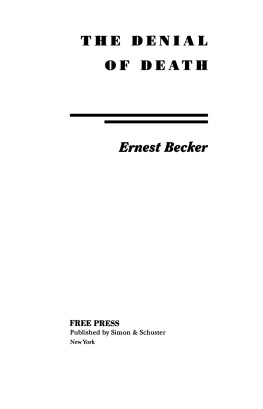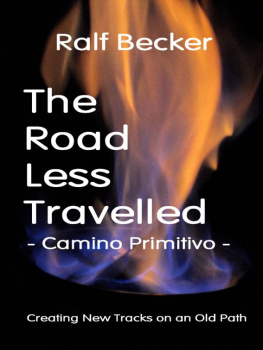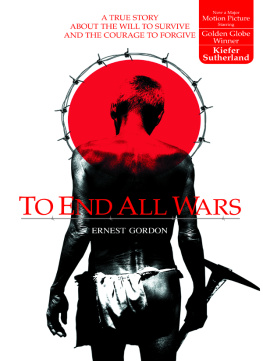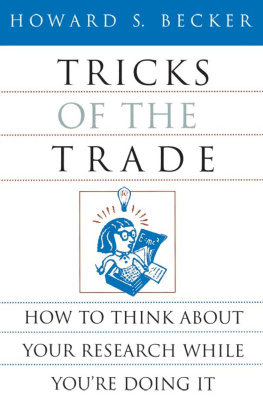We hope you enjoyed reading this Free Press eBook.
Sign up for our newsletter and receive special offers, access to bonus content, and info on the latest new releases and other great eBooks from Free Press and Simon & Schuster.

or visit us online to sign up at
eBookNews.SimonandSchuster.com
Thank you for purchasing this Free Press eBook.
Sign up for our newsletter and receive special offers, access to bonus content, and info on the latest new releases and other great eBooks from Free Press and Simon & Schuster.

or visit us online to sign up at
eBookNews.SimonandSchuster.com
CHALLENGING
POWERFUL
MAGNIFICENT
one of the most challenging books of the decade.
Anatole Broyard, The New York Times
A magnificent psychophilosophical synthesis which ranks among the truly important books of the year. Professor Becker writes with power and brilliant insight moves unflinchingly toward a masterful articulation of the limitations of psychoanalysis and of reason itself in helping man transcend his conflicting fears of both death and life his book will be acknowledged as a major work.
Publishers Weekly
to read it is to know the delight inherent in the unfolding of a mind grasping at new possibilities and forming a new synthesis. The Denial of Death is a great bookone of the few great books of the 20th or any other century.
Albuquerque Journal Book Review
a splendidly written book by an erudite and fluent professor. He manifests astonishing insight into the theories of Sigmund Freud, Otto Rank, Soren Kierkegaard, Carl Jung, Erich Fromm, and other giants. Becker has written a powerful book.
Best Sellers
a brilliant, passionate synthesis of the human sciences which resurrects and revitalizes the ideas of psychophilosophical geniuses. The Denial of Death fuses them clearly, beautifully, with amazing concision, into an organic body of theory which attempts nothing less than to explain the possibilities of mans meaningful, sane survival.
Minneapolis Tribune
magnificent not only the culmination but the triumph of Beckers attempt to create a meaningful science of man a moving, important and necessary work that speaks not only to the social scientists and theologians but to all of us finite creatures.
Commonweal
BRILLIANT
ORIGINAL
PROFOUND
a brave work of electrifying intelligence and passion, optimistic and revolutionary, destined to endure.
New York Times Book Review
a brilliant and desperately needed synthesis of the most important disciplines in mans life. It puts together what others have torn in pieces and rendered useless. It is one of those rare masterpieces that will stimulate your thoughts, your intellectual curiosity, and last, but not least, your soul.
Elisabeth Kbler-Ross, M.D., author of On Death and Dying
balanced, suggestive, original. Gradually and thoughtfullyand with considerable erudition and vervehe introduces his readers to the intricacies (and occasional confusions) of psychoanalytic thinking, as well as to a whole philosophical literature.
Washington Post Book World
An original, creative contribution to a synthesis of this generations extensive explorations in psychology and theology.
The Boston Herald American
Fascination and brilliance pervade this work one of the most interesting and certainly the most creative book devoted to the study of views on death...courageous.
The Minnesota Daily
A profound synthesis of theological and psychological insights about mans nature and his incessant efforts to escape the burden of lifeand death. It is hard to over-estimate the importance of this book; Becker succeeds brilliantly in what he sets out to do, and the effort was necessary.
The Chicago Sun-Times



FREE PRESS
A Division of Simon & Schuster Inc.
1230 Avenue of the Americas
New York, NY 10020
www.SimonandSchuster.com
Copyright 1973 by The Free Press
All rights reserved,
including the right of reproduction
in whole or in part in any form.
FREE PRESS and colophon are trademarks
of Simon & Schuster Inc.
Visit us on the World Wide Web:
http://www.SimonSays.com
ISBN-13: 978-1-4165-9034-7
ISBN-10: 1-4165-9034-X
Library of Congress Cataloging-in-Publication Data Is Available
Contents
To the memory of my beloved parents, who unwittingly gave meamong many other thingsthe most paradoxical gift of all: a confusion about heroism .
Non ridere, non lugere, neque detestari, sed intelligere . (Not to laugh, not to lament, not to curse, but to understand.)
SPINOZA
The first words Ernest Becker said to me when I walked into his hospital room were: You are catching me in extremis. This is a test of everything Ive written about death. And Ive got a chance to show how one dies, the attitude one takes. Whether one does it in a dignified, manly way; what kinds of thoughts one surrounds it with; how one accepts his death.
When The Denial of Death arrived at Psychology Today in late 1973 and was placed on my desk for consideration it took me less than an hour to decide that I wanted to interview Ernest Becker. On December 6th, I called his home in Vancouver to see if he would do a conversation for the magazine. His wife, Marie, told me he had just been taken to the hospital and was in the terminal stage of cancer and was not expected to live for more than a week Unexpectedly, she called the next day to say that Ernest would like to do the conversation if I could get there while he still had strength and clarity. So I went to Vancouver with speed and trembling, knowing that the only thing more presumptuous than intruding into the private world of the dying would be to refuse his invitation.
Although we had never met, Ernest and I fell immediately into deep conversation. The nearness of his death and the severe limits of his energy stripped away the impulse to chatter. We talked about death in the face of death; about evil in the presence of cancer. At the end of the day Ernest had no more energy, so there was no more time. We lingered awkwardly for a few minutes, because saying goodbye for the last time is hard and we both knew he would not live to see our conversation in print. A paper cup of medicinal sherry on the night stand, mercifully, provided us a ritual for ending. We drank the wine together and I left.
That day a quarter of a century ago was a pivotal event in shaping my relationship to the mystery of my death and, therefore, my life. I will carry for a lifetime the images of Ernests courage, his clarity purchased at the cost of enduring pain, and the manner in which his passion for ideas held death at bay for a season. It is a privilege to have witnessed such a man in the heroic agony of his dying.
In the years since his death, Becker has been widely recognized as one of the great spiritual cartographers of our age and a wise physician of the soul. Gradually, reluctantly, we are beginning to acknowledge that the bitter medicine he prescribescontemplation of the horror of our inevitable deathis, paradoxically, the tincture that adds sweetness to mortality.
Next page










